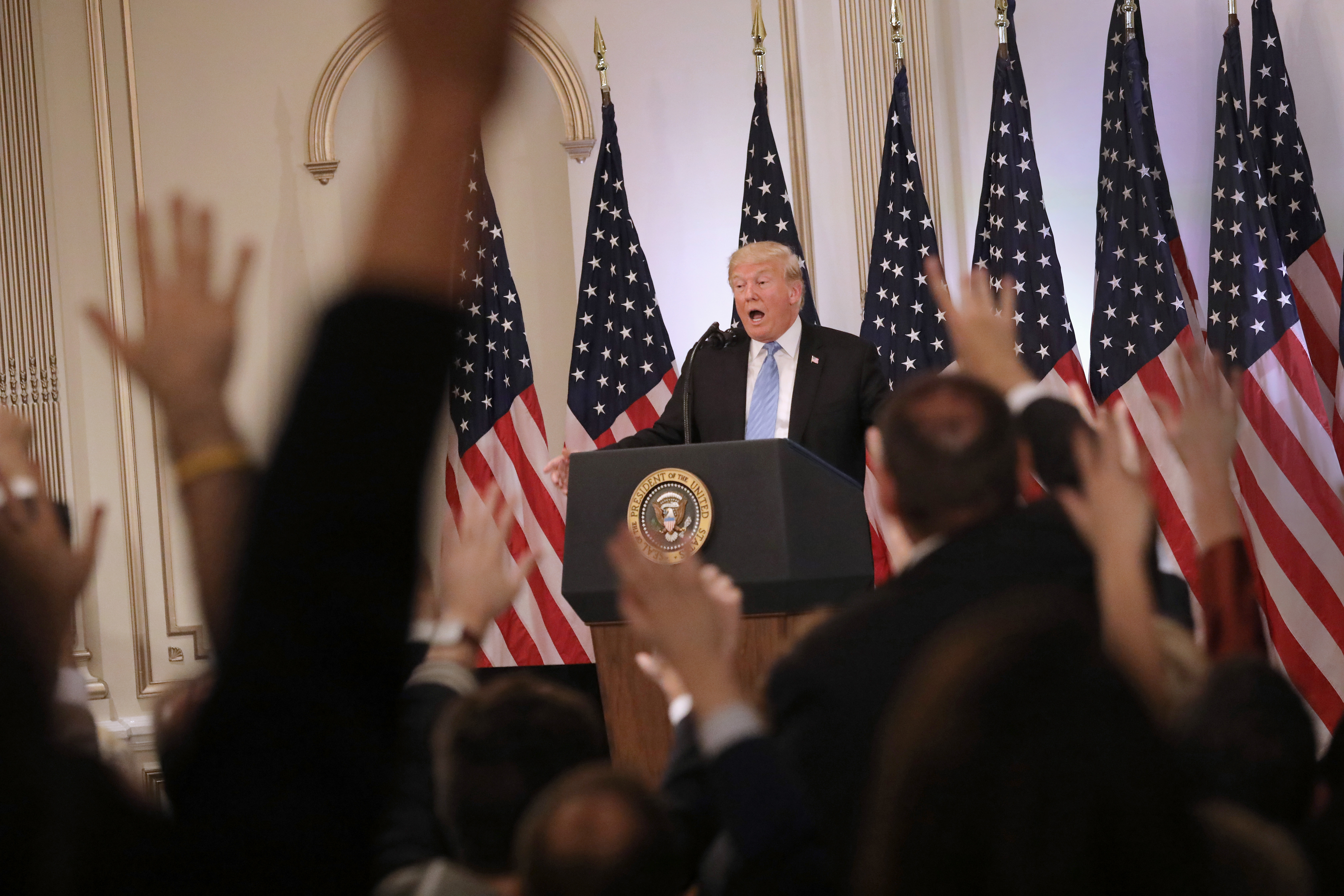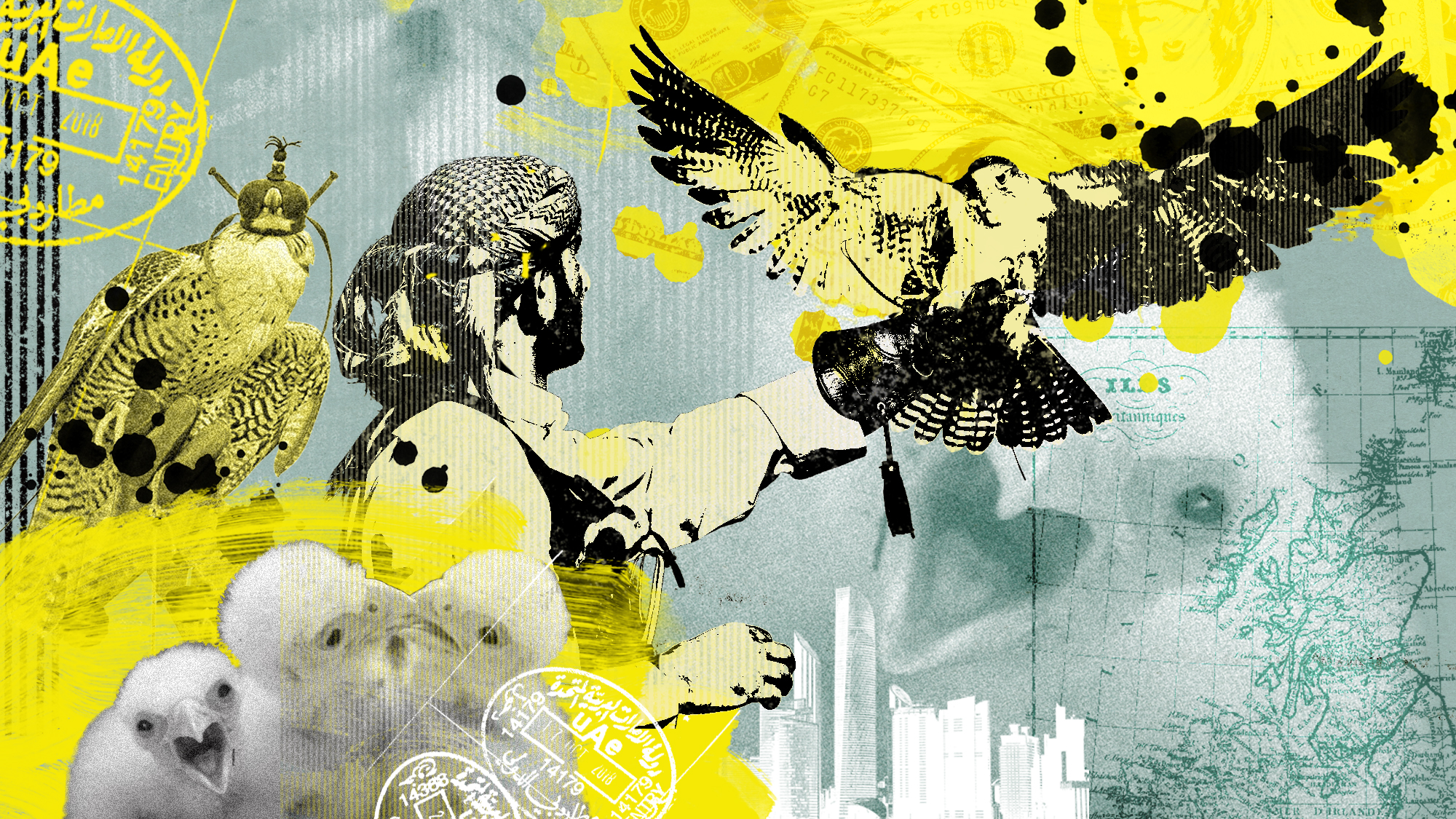Takeaways from Trump's bonkers press conference
The 80-minute presser was a circus. Here's what we learned.


The media has complained mightily about President Trump's perceived inaccessibility to the press and the public. A few months ago, after it had been more than a year since Trump's last solo appearance before a room full of journalists, Bloomberg called this "the end of presidential press conferences," and lamented that "presidential press conferences are an institution worth saving."
Are they? After Trump's insane 80-minute United Nations press conference on Wednesday, maybe the answer is no.
The appearance was just the fifth solo presser of Trump's White House tenure, and it was a circus. Surely, it couldn't have left many observers wanting more. Watching Trump interact with reporters, and trying to track both his syntax and his falsehoods in real time, was exhausting.
The Week
Escape your echo chamber. Get the facts behind the news, plus analysis from multiple perspectives.

Sign up for The Week's Free Newsletters
From our morning news briefing to a weekly Good News Newsletter, get the best of The Week delivered directly to your inbox.
From our morning news briefing to a weekly Good News Newsletter, get the best of The Week delivered directly to your inbox.
The performance was reminiscent of those once offered by strongmen dictators like Fidel Castro or Hugo Chavez, both known for their endless orations: Castro once spoke for four-and-a-half hours at the U.N., and that wasn't even his personal record. There were reporters on hand during Trump's presser, trying to ask questions, but they could barely get a word in edgewise. The assembled journalists were little more than props for The Donald Trump Show.
The president certainly seemed to be enjoying himself. "I could be doing this all day long," he said. "Should we continue for a little it doesn't matter to me. A couple more? I don't care."
Conservatives on Twitter praised him for the aura of command he exuded, while liberals saw a man often manufacturing his own reality while going off on tangents that had little to do with the original questions.
Timing here is everything. This event took place on the eve of the Senate hearings for Supreme Court nominee Brett Kavanaugh, who has been accused by several women of sexual assault. Kavanaugh will testify, as will one of his accusers. This is arguably one of the most pivotal days of the Trump presidency, and it could heavily influence the next months and years of the administration.
A free daily email with the biggest news stories of the day – and the best features from TheWeek.com
So, what did we learn from Trump's presser?
First, we learned the president doesn't want you to believe your own eyes and ears. On Tuesday, the U.N. General Assembly openly laughed at Trump's proclamation that his "administration has accomplished more than almost any administration in the history of our country." Fake news, Trump declared Wednesday.
"They weren't laughing at me," he said. "They were laughing with me."
We also were reminded that, when Trump isn't denying reality, he's making stuff up. The worst example of this to be found in his presser came when he suggested the Obama administration was on the precipice of war with North Korea before the 2016 election.
"If I wasn't elected, you would have had a war," Trump said. "President Obama thought you had to go to war. You know how close he was to pressing the trigger for war?"
Not very close! Obama, like Presidents George W. Bush and Bill Clinton before him, was committed to North Korea's denuclearization — but there was never any indication he was ready for an armed conflict on the Korean peninsula. This near-war exists only in Trump's mind.
We learned Trump literally can't keep a promise for more than 15 seconds. "I'm not going to use the name NAFTA. I refuse to use it," Trump said of the trade treaty. "I've seen thousands of plants and factories close. I've seen millions of jobs lost to auto companies that moved. Remember, Mexico has 25 percent of our auto business now because of NAFTA."
In the transcript, it takes Trump only half a paragraph to move from refusing to say "NAFTA" to saying it. That may be a record of some kind.
Another takeaway? Women, you're on your own. It's probably too much to expect the famously misogynistic Access Hollywood president to give much of a hearing to women who accuse powerful men — specifically Republican men — of sexual assault. Trump tried to sound like he'd keep an open mind about Christine Blasey Ford's allegations during her testimony, but it was clear where his real sympathies lie.
"I've had many false charges," he said, before adding: "So when you say, 'Does it affect me in terms of my thinking with respect to Judge Kavanaugh?' Absolutely, because I've had it many times."
Believing women is not on Trump's agenda.
But if we learned anything truly new during Wednesday's press conference, it was how little Trump believes his own "enemy of the people" shtick when it comes to the press itself. He may decry "fake news" and "the failing New York Times," but he was flattering and wooing individual reporters throughout the press conference, even while trashing their organizations in the same breath.
"The Times is failing," he said while calling on a female reporter. "You are far from failing," he said. It was an icky moment.
The problem, for journalists, is this: You will never elicit any kind of truth from Trump, only quotes. For a president who so enjoys being the center of attention but has little use for actual facts, that's a feature, not a bug. But it is also a miserable way to inform an audience and help them be better citizens. Wednesday's presser is a sign that news conferences are just one more American institution that Trump will be happy to leave in tatters.
Joel Mathis is a writer with 30 years of newspaper and online journalism experience. His work also regularly appears in National Geographic and The Kansas City Star. His awards include best online commentary at the Online News Association and (twice) at the City and Regional Magazine Association.
-
 The elite falcon trade in the Middle East
The elite falcon trade in the Middle EastUnder the Radar Popularity of the birds of prey has been ‘soaring’ despite doubts over the legality of sourcing and concerns for animal welfare
-
 A running list of the international figures Donald Trump has pardoned
A running list of the international figures Donald Trump has pardonedin depth The president has grown bolder in flexing executive clemency powers beyond national borders
-
 Mixed nuts: RFK Jr.’s new nutrition guidelines receive uneven reviews
Mixed nuts: RFK Jr.’s new nutrition guidelines receive uneven reviewsTalking Points The guidelines emphasize red meat and full-fat dairy
-
 The billionaires’ wealth tax: a catastrophe for California?
The billionaires’ wealth tax: a catastrophe for California?Talking Point Peter Thiel and Larry Page preparing to change state residency
-
 Bari Weiss’ ‘60 Minutes’ scandal is about more than one report
Bari Weiss’ ‘60 Minutes’ scandal is about more than one reportIN THE SPOTLIGHT By blocking an approved segment on a controversial prison holding US deportees in El Salvador, the editor-in-chief of CBS News has become the main story
-
 Has Zohran Mamdani shown the Democrats how to win again?
Has Zohran Mamdani shown the Democrats how to win again?Today’s Big Question New York City mayoral election touted as victory for left-wing populists but moderate centrist wins elsewhere present more complex path for Democratic Party
-
 Millions turn out for anti-Trump ‘No Kings’ rallies
Millions turn out for anti-Trump ‘No Kings’ ralliesSpeed Read An estimated 7 million people participated, 2 million more than at the first ‘No Kings’ protest in June
-
 Ghislaine Maxwell: angling for a Trump pardon
Ghislaine Maxwell: angling for a Trump pardonTalking Point Convicted sex trafficker's testimony could shed new light on president's links to Jeffrey Epstein
-
 The last words and final moments of 40 presidents
The last words and final moments of 40 presidentsThe Explainer Some are eloquent quotes worthy of the holders of the highest office in the nation, and others... aren't
-
 The JFK files: the truth at last?
The JFK files: the truth at last?In The Spotlight More than 64,000 previously classified documents relating the 1963 assassination of John F. Kennedy have been released by the Trump administration
-
 'Seriously, not literally': how should the world take Donald Trump?
'Seriously, not literally': how should the world take Donald Trump?Today's big question White House rhetoric and reality look likely to become increasingly blurred
